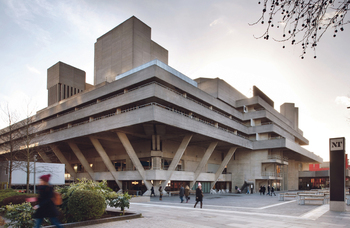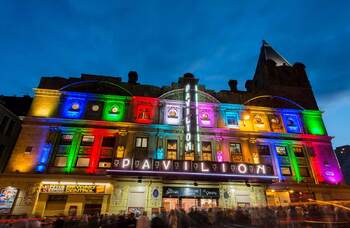Trafalgar Studios granted planning permission to merge two spaces into single auditorium
Trafalgar Studios has been granted planning permission to convert its two performance spaces into a single 630-seat auditorium.
The venue currently consists of a main space with 380 seats and a second 100-capacity studio space, which will cease to exist following the renovation.
This will revert the venue, formerly called the Whitehall Theatre, back to its original configuration before it was split into two spaces in 2004.
Other changes outlined across three planning applications, all of which have been approved, include restoring the theatre’s original Art Deco style, refitting the stalls basement bar, improvements to toilets and maintenance to the roof.
Rosemary Squire and Howard Panter, joint chief executives of Trafalgar Entertainment, are the owners of Trafalgar Studios. Squire and Panter also founded Ambassador Theatre Group, which was the previous owner of the venue, and were behind the 2004 alterations.
A spokeswoman for Trafalgar Entertainment told The Stage: "We applied for planning permission before Covid-19 really took hold but we are delighted that planning consent has been granted.
"Right now, given the current climate, we have not made any definitive decisions about continuing with our plans."
In a letter to Westminster City Council submitted with the planning application, Squire and Panter said: "In 2004, we renamed the Theatre Trafalgar Studios (from the Whitehall Theatre), and secured planning permission and listed building consent to convert it into two auditoria.
"The listed building consent given at that time required these alterations to be reversible, and most of the works were constructed in lightweight materials, which could be removed relatively easily.
"The original circle front, which was removed, was saved and is stored in the theatre. The reversible design approach adopted in 2004 means that the re-conversion of the theatre to its original form can be achieved relatively easily, and without major structural alterations."
Squire and Panter said that at the time of the theatre’s conversion into two spaces, the West End "lacked smaller performance space that could accommodate developing talent in the industry to present new work".
They argue that in the 15 years since the theatre’s conversion, there have been new venues in central London meeting that need, citing the Bridge Theatre, the Boulevard Theatre and the new Nimax Theatre, which is being built.
The letter adds: "The reconversion of the theatre will create a single c630 seat auditorium, which will enable the theatre to attract a broader range of shows with, we anticipate, longer runs."
The Theatres Trust also supported the planning applications.
National planning advisor Tom Clarke said: "We are supportive of these works, in particular that they will restore the theatre’s historic character and retain and reuse historic features of significance such as hardwood timber doors and ironmongery, while improving the function of the building.
"Where there is more significant intervention, this is into parts of the building, such as the stalls bar, which have already been substantially altered and contain little original fabric.
"The investment into the theatre more generally is to be welcomed. Therefore we recommend the granting of listed building consent."
More about this organisation
Production News
Recommended for you
More about this organisation
Production News
Recommended for you
Most Read
Across The Stage this weekYour subscription helps ensure our journalism can continue
Invest in The Stage today with a subscription starting at just £7.99


















